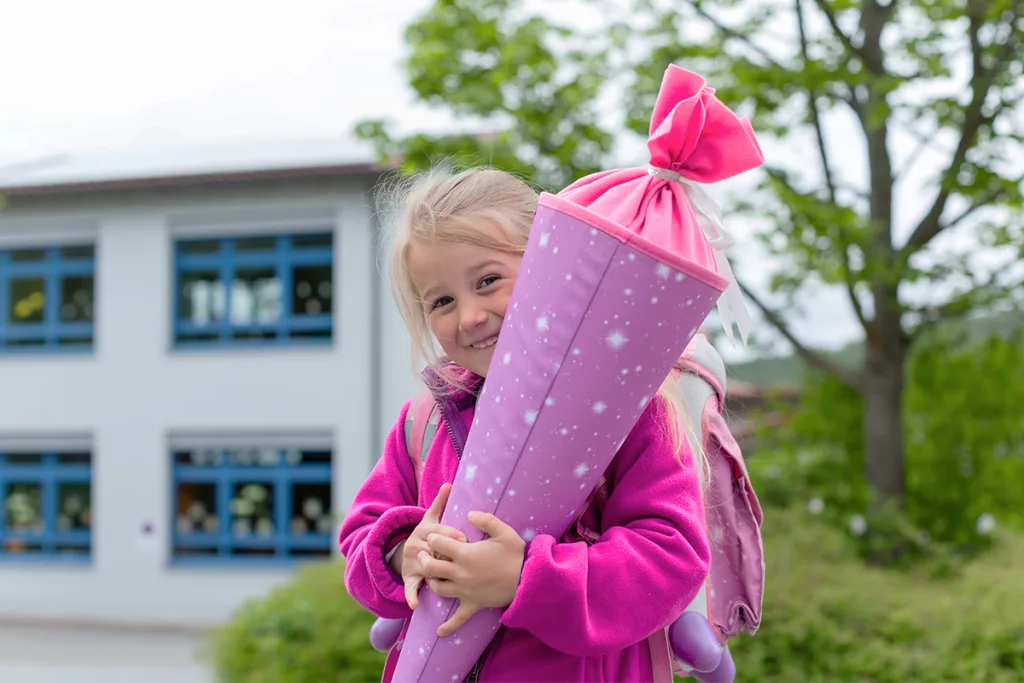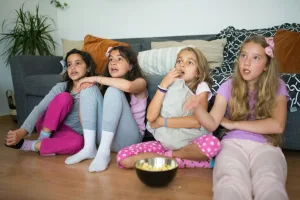Germany is known for its many unique characteristics, from charming villages and decorative historical castles to reliable, sophisticated cars and soft, fluffy pretzels. But perhaps one of the most endearing aspects of life in Germany is the deep-rooted appreciation for cultural traditions. With a strong sense of heritage, citizens love to keep German traditions alive through celebratory festivals and customs. This is one way they can remain connected to their country, history, and family, even when they are miles away.
If you have welcomed an Au Pair from Germany into your home, finding ways to honor these traditions can be especially comforting and meaningful for them. Integrating German customs into your family life not only celebrates the cultural background of your Au Pair but also enriches your family’s cultural experiences. So, let’s dive into popular German traditions and customs and explore several tips for incorporating them into your own family celebrations!
8 German Traditions and Customs to Celebrate with Your Au Pair
Your German Au Pair is set to arrive in America soon, and you are eager to celebrate their customs to help ease the transition into their new environment. Fortunately, they have a rich history and culture, so there’s no shortage of traditional practices to explore. In Germany, traditions and observances are sprinkled throughout the year so no matter when your Au Pair arrives, a celebratory occasion may be right around the corner! Here are some of the most popular German traditions and festivals:
1. Schultüte
When it’s celebrated: First day of school
As a parent of young children, you may want to find celebrations that provide opportunities for connection between your new Au Pair and your little one. So, what traditions does Germany have for children?
Schultüte, which translates to “school cone” is the perfect occasion. It’s an adorable tradition initially established to help ease the anxiety many little ones experience on their first day of school. Parents fill a large, colorful cone-shaped container with sweets, treats, school supplies, and sometimes small toys, which is given to children to celebrate their first day of school. The contents of the Schultüte add an element of excitement and sweetness to the day.
Today, Schultüten are so popular that they are sold in department stores across the country, typically during July and August, in preparation for the school year. They’re given to children of all ages, from primary to high school, and even to those embarking on their post-secondary journey! This tradition underscores the importance of education in German culture, and celebrating it can be a delightful experience for your Au Pair and child.
2. St. Martin’s Day
When it’s celebrated: November 11th
St. Martin’s Day is one of the most celebrated religious traditions in Germany. Known for its warmth and communal spirit, this tradition is predominantly celebrated by Catholics, who come together to honor St. Martin of Tours — a Roman soldier who later became a bishop and was known for his compassion and helping those in need.
The festivities include a parade of young children who carry paper lanterns, symbolizing light in the darkness — a nod to the story of St. Martin. They sing songs like Ich geh’ mit meiner Laterne (“I go with my lantern”) to honor his generosity and humility. After the parade, the community gathers to eat special seasonal foods, like roasted goose, Weckmänner (sweet pastries), and savory potato cakes. In some regions, there may even be a bonfire before winter begins, to symbolize the light of St. Martin’s charitable acts.
If your Au Pair celebrates St. Martin’s Day, you can make them feel at home by crafting paper lanterns and cooking some of the delicious dishes associated with the day.
 3. Sankt Nikolaus Day
3. Sankt Nikolaus Day
When it’s celebrated: December 6th
Of all the German traditions and customs on this list, Sankt Nikolaus Day is perhaps one of the more familiar to Americans, since it resembles the tradition of Christmas. In fact, the version of Santa Claus we all know is based on the same character Germans know as Sankt Nikolaus. Unlike in America, however, Sankt Nikolaus Day is celebrated modestly, as it’s based on a bishop known for generosity.
The cherished tradition requires children to polish their boots and set them out on their doorstep, hoping to receive small gifts or treats left by Sankt Nikolaus during the night, as a reward for good behavior throughout the year. If the child has behaved poorly, tradition states they may receive a stick or twig in their boot, although this is more of a fable than an actual practice.
Sankt Nikolaus Day serves as a prelude to the Christmas season, starting the festive period with a celebration emphasizing kindness and good deeds. This day allows children to engage in the festive spirit of giving and receiving and is a special way to honor German traditions around the holidays for your Au Pair.
4. Christmas Advent Calendar Activities
When it’s celebrated: The month of December
Aside from Sankt Nikolaus Day, there’s another German custom your family may be participating in without even realizing it. Wondering what are some German traditions that your family is already celebrating? Does the concept of advent calendars sound familiar? Even though these recognizable countdown calendars can be found in stores across the United States in the months leading up to Christmas, they are actually a traditional German innovation. In fact, the first advent calendar dates all the way back to 1851 in Germany and was likely made by hand!
Traditionally, the calendars featured imagery of the nativity scene, and a candle would be lit for each day leading up to Christmas. It wasn’t until the 1940s that individual Christmas village scenes were added for each day, and the chocolate-filled versions we use today didn’t emerge until 1958.
You can turn the tradition into a family-friendly occasion by including a holiday-themed activity behind each door of your homemade calendar — like baking gingerbread cookies or building a snowman if weather permits. That way, the advent calendar becomes not just a countdown, but an interactive experience that builds excitement and joy throughout the season, bringing the festive spirit to your Au Pair during the holidays.
 5. Watch “Dinner for One” on New Year’s Eve
5. Watch “Dinner for One” on New Year’s Eve
When it’s celebrated: December 31st and January 1st
“Dinner for One” is a brief black-and-white film that lasts about 10 minutes and is a truly unique aspect of German culture. Known in Germany as “Der 90. Geburtstag” (The 90th Birthday), this British comedy sketch has become integral to New Year’s Eve celebrations in Germany. It airs on all major television networks from December 31st to January 1st, with some stations playing it more than once. The tradition is so well-honored, in fact, that the film is listed in the Guinness Book of World Records as the most frequently repeated TV program ever.
Of all the customs and traditions in Germany, this is one that you can easily and effortlessly replicate in your own home. Watching this on YouTube is a simple way to participate in the tradition and provides a quirky, light-hearted way of bringing a bit of German New Year’s culture into your celebration.
6. Create Your Own Karneval
When it’s celebrated: The week leading up to Ash Wednesday
With all these winter-themed occasions, you may be eager for cultural traditions that get you outside for fun in the sun. So, what are some traditions in Germany that are celebrated in warm-weather months?
Karneval, also known as Fasching or Fastnacht in some German regions, is a perfect place to start, as it’s a lively celebration that happens before Lent begins. It includes parades, fun costumes, and a large dose of merriment — much like Mardi Gras in the United States.
During Karneval, cities across Germany come alive with music, dancing, and street performances, as locals and visitors alike don whimsical costumes and masks to join in the festivities. It’s meant to provide people with a period of freedom and festivity before the solemnity of Lent.
Since Karnival is one of the most exciting cultural traditions in Germany, it’s a great way to create lifelong memories with your family and your Au Pair. You can decorate your home, create masks, play festive German music, and include typical Karneval foods like Berliners (jelly doughnuts!) to make your Au Pair feel right at home.
7. Bake Osterbrot
When it’s celebrated: Easter Sunday
Baking Osterbrot, or Easter bread, is one of the most widely practiced German family traditions. This delectable sweet bread is made with eggs, spices, dried fruits, and sometimes even citrusy zest for a touch of brightness. Including eggs in the dough symbolizes new life and rebirth, which aligns with the Easter theme of resurrection. Spices and fruits make the bread rich and flavorful and are meant to represent abundance.
Osterbrot is typically enjoyed as a staple of Easter brunch, with children and adults alike looking forward to savoring each sumptuous bite. It’s a culinary highlight that brings families together to celebrate the end of Lent and the festive Easter season. You can introduce your family to a tasty example of German traditions and customs by baking your own version of Osterbrot together at home.
 8. Celebrate Maifest
8. Celebrate Maifest
When it’s celebrated: May 1st
Maifest, also known as “May Day” in English, is how Germans welcome the arrival of Spring and is marked by several vibrant customs. The celebration typically begins with putting up a Maibaum (maypole) on the village green. But before this ribbon-decorated pole is erected, it’s customary for townspeople to parade through the town or villages while a brass band plays, and then enjoy a celebration with beer and Bratwurst.
Some great ways to participate in Maifest are to barbecue sausages in your backyard, play outdoor games like tug-of-war or hopscotch, and decorate your yard with flowers and ribbons. This occasion can be a fun, engaging way to participate in a German cultural tradition with your Au Pair while enjoying the outdoors and festive activities.
Find an Au Pair with Go Au Pair
You now have ample opportunities to incorporate German traditions into your home and help your Au Pair feel welcome while staying with your family!
At Go Au Pair, we are dedicated to helping host families find Au Pairs they connect with so they can feel confident about inviting them into their homes and providing childcare for their little ones. If you’re interested in becoming a host family, we’d be happy to help guide you through the process and provide you with additional resources, like Au Pair interview questions and a walkthrough of the host family process. Sign up here to become a host family today or reach out with questions!



 3. Sankt Nikolaus Day
3. Sankt Nikolaus Day  5. Watch “Dinner for One” on New Year’s Eve
5. Watch “Dinner for One” on New Year’s Eve 8. Celebrate Maifest
8. Celebrate Maifest